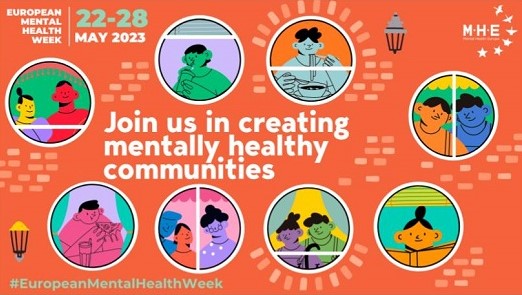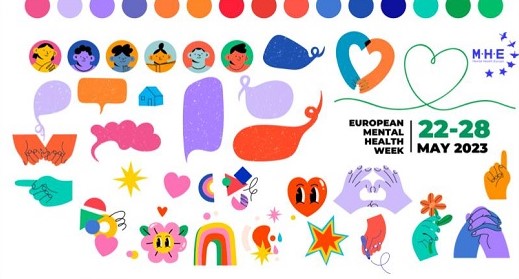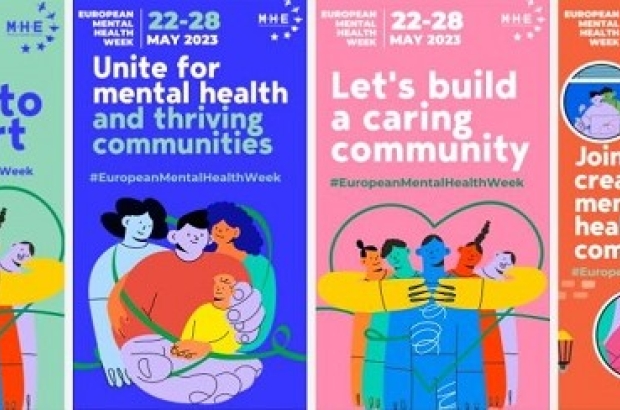- Daily & Weekly newsletters
- Buy & download The Bulletin
- Comment on our articles
Community at the heart of European Mental Health Week campaign
Brussels-based Mental Health Europe (MHE) hosts the fourth edition of the European Mental Health Week from 22 to 28 May.
The online campaign is running under the banner ‘Mentally Healthy Communities’. As a pan-European initiative, its main objective is to raise awareness about mental health and wellbeing while reducing the stigma and discrimination that continues to surround it.
Ongoing crises following the coronavirus pandemic are challenging people's mental health. They highlight the urgent need for individuals, communities, and societies to develop a better understanding of mental health and to invest in the necessary resources, says MHE.
It will be releasing key policy recommendations at its high-level hybrid ‘How Mentally Healthy Communities Can Make Us Thrive’ at the European Parliament in Brussels on 24 May.
The recommendations recognise that while individual skills are important, structural changes are also needed.
MHE director Claudia Marinetti explains: “This year's European Mental Health Week aims to shift the focus from mental health being isolated within individuals to recognising it as an integral part of our communities. By understanding how mental health is inextricably linked to the places where we live, work, learn, and spend time with others, we can take real action where it's most needed.”
During the action week, MHE offers a diverse range of online events, resources, and social media activities aimed at promoting mental wellbeing. Its members, partners and organisations across Europe will also be hosting events and initiatives that highlight the importance of mental health in all aspects of life.
It’s an opportunity for everyone to come together, exchange views about all aspects of mental health and share stories, says MHE.
On a practical level, what does community action mean for people living with mental health difficulties? The Bulletin talks to two families in Brussels about how they are coping with the challenges.

As the mother of a teenage son with mental health challenges, Rozina Spinnoy is an active member of MHE and Autism Europe. The social entrepreneur and design strategist campaigns for patient-centric and collaborative community care.
“What do we mean by ‘care in the community?’ It’s a model of mental health care that aims to provide individuals with mental health conditions with appropriate care and support within their communities, rather than in institutions.
However, the lack of consistent local community care support for mental health care has been challenging for us as a family in the past, as authorities can at times create more traumatic outcomes with outdated procedures like involuntary hospitalisation. This only highlights the need for more education and a human rights-based approach to mental health care.
Based on our family’s experience, collaboration, education and empowering patients and their families are key learnings. Mental health professionals should work with other healthcare providers, schools and families, while community organisations and support groups are vital for comprehensive care.
Education and peer support can help manage day-to-day and crisis moments effectively. Empowering patients and families, even minors, to have a say in their treatment builds trust and can help manage their condition as they grow into adulthood.
Developing a systematic care in the community approach involves taking a collaborative, integrated, multi-sector and stakeholder approach.
Through collaboration, education and good communication, we can empower communities and families like ours to achieve better outcomes, especially for patients of all ages, including youth.”

Liz Newmark and her daughter Lauren, 18, each share their experience following Lauren’s recent short stay in a psychiatric unit in Brussels.
“As a student in 1990, I visited a close friend in an ageing psychiatric hospital. It reminded me of the film One Flew Over the Cuckoo’s Nest: long corridors and stark white wards full of patients listless in bed. There was no activity or interaction, which translated into little help with a mental health crisis. Not surprisingly, my friend eventually ‘escaped’.
Fast forward to last weekend when I picked up my 18-year-old daughter Lauren from a Brussels-based psychiatric hospital for 12-20 year olds. She had stayed there 10 days on an ‘emergency bed’ basis.
Set in a beautifully leafy part of the city, backing on to sports grounds, the unit has a real ‘classes vertes’ feel. Each young person chooses one set activity every day, normally art or creative-based with sports available in the afternoon and evening. There are regular day trips – in her short stay, Lauren went to Tervuren, Namur and local parks to do mountain biking and hiking. There are also group projects – notably the beautiful mural in the hospital grounds.
Recreation aside, each child has a set treatment programme with a counsellor, psychiatrist and family therapist, with extra medical help also provided. Moreover, the centre is linked to l’Ecole Escale – a hospital schools programme – which makes it easier to return to school after a stay.
Family can make daily visits: there are two slots between 16.00 and 20.00 after the (cold) evening meal – with everyone eating together in the supervised communal area. Otherwise, solo trips out are strictly monitored, starting from one hour and stretching to whole weekends, depending on the individual case history.
Young people here suffer from self-harm, suicidal thoughts and addictions (chronic psychiatric conditions are not catered for). For me, it is a sensible approach: anorexia is never just anorexia – it can be the tip of the iceberg of other mental health issues. A sister hospital focuses on eating disorders.
With this year’s European mental health week centering on communities, the institution Lauren stayed in exemplifies how living, working and eating together can boost mental health. The teenagers form close bonds, almost a family that in some cases they never had or have.
Sadly these places do not wave magic wands; the transition can be hard when your child comes home. Getting a place is a challenge – with waiting lists around three months. But they show that help is possible in a humane environment. All that is needed is a ton more funding to build more such institutions and action to increase awareness in the wider community that mental health is not just Jack Nicholson going crazy in a white coat…”
Lauren
“The success of a visit depends in some way on the group of people you meet. It is not ideal for an addict to encounter someone who will introduce you to a new drug. You make special bonds with people who will understand your needs and problems, which is more difficult on the outside, and it was good to be able to help each other.
I liked the people and activities best: the hospital has its own gym, climbing room, tennis court, basketball, football, gym and dance hall. If you ever felt angry or upset you could even ask to hit a punching ball.
There was always a chance to talk – from the morning meeting where you could request to see a psychologist or doctor to the 20.00 discussion about how your day had gone. At set times in the night a nurse comes to your room to see if everything is OK. All rooms also have emergency buttons.
My part of the hospital was for people asking for voluntary treatment. Another section was for children placed by the judge, but we often met them on evening walks or even on day trips to the sea, which again increases the community feel.”


















